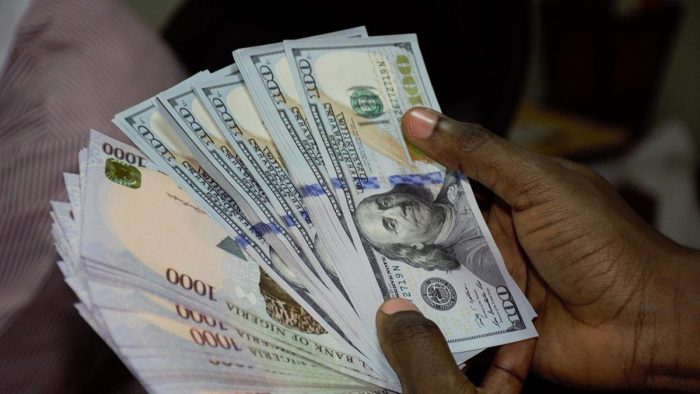The naira gained across foreign exchange markets as the dollar crashed further to N1,567 on Thursday, following the newly introduced electronic forex trading framework by the Central Bank of Nigeria (CBN).
This represents a 2.5 percent or N41 gain for the naira compared to N1,698 quoted on Wednesday at Nigerian Foreign Exchange Market (NFEM), according to data obtained from the CBN’s exchange rate portal released on Thursday.
The naira, which peaked at N1,681.45 on November 6, 2024, gained N114.45.45 to close at N1,567 per dollar at the Nigerian official FX market, NFEM.
Read also: Dollar crashes to N1,608 at official market after CBN’s new FX framework
The naira closed at N1,608 per dollar, gaining 4.6 percent or N73.45 at the Nigerian Foreign Exchange Market, the data showed.
Authorised forex dealers quoted the dollar at the lowest rate of N1,565, stronger than N1,590 on Wednesday and N1,623 seen on Tuesday. The market also recorded the highest bid of N1, 610, stronger than N1,630 the previous day and N1,664 quoted on Tuesday at NFEM.
In a bid to strengthen the governance and transparency of Nigeria’s foreign exchange market, the CBN introduced revised guidelines for the NFEM.
The revised guidelines aim to deepen the foreign exchange market following the consolidation of all official FX market windows. The circular, issued by Omolara Omotunde Duke, director of the CBN’s financial markets department, supersedes prior directives, including the operational changes announced on June 14, 2023, and earlier circulars dating back to 2017.
Under the new framework, authorised dealers must facilitate FX transactions for firms and individuals while ensuring compliance with regulations. These dealers are tasked with conducting due diligence, providing transparent pricing and offering market access through digital solutions. Furthermore, all legitimate FX transactions must occur exclusively through authorised dealers, while dealings with unlicensed intermediaries are strictly prohibited.
The CBN outlined permitted FX transactions, including all trade-backed (visible and invisible) transactions. Dealers are required to verify the necessary documentation before processing any transaction. Pricing for these transactions is to be conducted on the Electronic Foreign Exchange Matching System (EFEMS), which will also publish daily transactional rates to enhance market transparency.
Read also: Why naira is appreciating and how long it may last
Any customer transaction conducted outside the EFEMS must align with prevailing NFEM rates, and negotiations outside the formal FX market are prohibited.
Interbank trading is permitted under the revised guidelines, with authorised dealers required to comply with set credit limits. Market makers will now provide daily two-way quotes to ensure liquidity. Additionally, all interbank transactions must occur on EFEMS to maintain transparency and adhere to the Nigerian FX Code.
Join BusinessDay whatsapp Channel, to stay up to date
Open In Whatsapp





